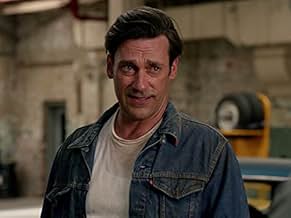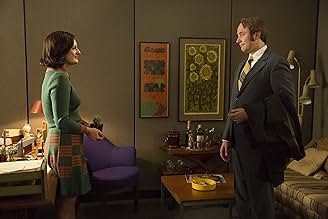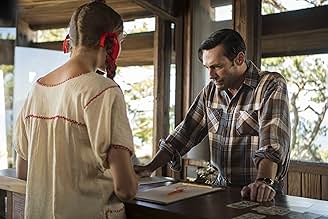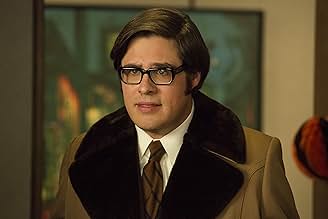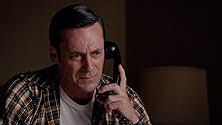Un drama sobre una de las agencias de publicidad más prestigiosas de Nueva York a principios de los 60, que se centra en uno de los ejecutivos más misteriosos pero con más talento de la firm... Leer todoUn drama sobre una de las agencias de publicidad más prestigiosas de Nueva York a principios de los 60, que se centra en uno de los ejecutivos más misteriosos pero con más talento de la firma, Donald Draper.Un drama sobre una de las agencias de publicidad más prestigiosas de Nueva York a principios de los 60, que se centra en uno de los ejecutivos más misteriosos pero con más talento de la firma, Donald Draper.
- Ganó 16 premios Primetime Emmy
- 166 premios y 450 nominaciones en total
Explorar episodios
Resumen
Reviewers say 'Mad Men' is lauded for its deep character studies, historical accuracy, and nuanced depiction of the 1960s, focusing on the advertising industry. The show delves into themes of identity, power, and societal change, with standout performances, especially Jon Hamm as Don Draper. Its meticulous period detail receives high praise. However, some viewers critique the slow pacing, repetitive storylines, and occasional frustration with character exits and unresolved plotlines.
Reseñas destacadas
10alexnapo
When I started watching Mad Men, the rhythm of it felt slow.
Pretty quickly did I realize how much more powerful the slow story & plot development rhythm would be, allowing us to discover the characters, mostly in seasons 1 and 2, and then really be in the thick of it in subsequent seasons.
Indeed, this series has pushed character development so far that they are the entire and only reason why this series is interesting. The actual events happening at the advertising agency is a pretext to throw more things at those characters and have them deal with it. In fact, the characters are so interesting that there is practically no violence needed (except a few minor events) over 7 seasons to keep this series going. I find that tremendously respectable to be able to craft a series in this way, not using gun shots and bombs to make it lively.
Finally, I have not lived in the early 60's time period the series is set in, but I can only say that it's all seemed to me very interesting and all these "vintinge" props and costumes, hair style and such made it all the more fascinating to watch.
Absolutely great work.
Pretty quickly did I realize how much more powerful the slow story & plot development rhythm would be, allowing us to discover the characters, mostly in seasons 1 and 2, and then really be in the thick of it in subsequent seasons.
Indeed, this series has pushed character development so far that they are the entire and only reason why this series is interesting. The actual events happening at the advertising agency is a pretext to throw more things at those characters and have them deal with it. In fact, the characters are so interesting that there is practically no violence needed (except a few minor events) over 7 seasons to keep this series going. I find that tremendously respectable to be able to craft a series in this way, not using gun shots and bombs to make it lively.
Finally, I have not lived in the early 60's time period the series is set in, but I can only say that it's all seemed to me very interesting and all these "vintinge" props and costumes, hair style and such made it all the more fascinating to watch.
Absolutely great work.
I'll be the first to admit that Mad Men is a show about watching people go to work and live their lives. It should be dull and uninteresting, yet somehow it managed to grip me for a whole 7 seasons and left me wanting more.
The setting is a big part of it. The historical interest of the time (JFK's assassination, the moon landing, England winning the World Cup, to name a few key points in the show) is enough to keep many gripped. It's more than that though. The characters in themselves are worth following and you get invested in them as the seasons progress.
To be frank I didn't like the first season. I just didn't get the formula and was getting close to giving up on the show. I'm glad I didn't though as it only improves from the second season onward.
The setting is a big part of it. The historical interest of the time (JFK's assassination, the moon landing, England winning the World Cup, to name a few key points in the show) is enough to keep many gripped. It's more than that though. The characters in themselves are worth following and you get invested in them as the seasons progress.
To be frank I didn't like the first season. I just didn't get the formula and was getting close to giving up on the show. I'm glad I didn't though as it only improves from the second season onward.
Mad Men was such a terrific show that is absolutely just as good as everyone says it is. I never watched it when it was originally on but after hearing so many great things about it I finally gave it a chance and streamed it. I was blown away but how much I loved it. There's a reason it won so many awards when it was on...because it's terrific! The acting, writing, directing, production, attention to detail, etc are all among the best in television history! I can see why some people may not like it because it does starts off a little slow but give it a few episodes because it absolutely pays off and then you won't want to stop watching it until you binge the entire series!
The journey is a most interesting one in Don Draper's universe that occupies a time (1960s) in American culture when changes occurred in warp speed. No Pollyanna view of the world, 'Mad Men' explores the full spectrum of human relationships, personality types, and emotions.
The show's creator Matthew Weiner (previously executive producer/writer of 'The Sopranos') takes viewers on a high-ball roller coaster of human experiences that explore pursuit of bliss, the depths of where one can go, and the winding roads of inner angst one must often travel.
'Mad Men' is the ultimate ensemble drama series with grown-up adult themes that drill deep into the human psyche and often self-destructive behavior patterns of the 1960s post-WWII Greatest Generation that populated the high-flying, high-pressure Madison Avenue ad agencies.
Those ad agencies created the culturally iconic images cast through television, radio and print media during that turbulent, mass-consumption decade in American society, when Baby Boomers started taking over the reigns of influence in America, much of it in conflict with Greatest Gen thinking.
There is nothing low key about 'Mad Men'. Tension and conflict is layered throughout the series. Weiner covers a lot of territory of the human experience that exists inside complex personalities and their relationships, and the intense emotions that often accompany them.
As it stands now, 'Mad Men' is the best TV drama series of all-time; I don't believe there is even a close second.
The show received 4 consecutive "Outstanding Drama Series" Emmys (21 total Emmy wins out of 116 nominations) to close out it's relatively brief pre-determined tenure of 7 seasons.
Those who have seen every episode in sequence, experience a level of high-quality TV viewing that sets the bar to the pinnacle, and rivals the best theatrical movies in production, casting, acting, and story-telling.
Matthew Weiner's unique concept alone puts it into a must-try category.
For those who have seen the entire series, it is even better the second, third time around (and one gains value in more rapid linear viewing, rather than having to wait months to see the next season, or a week to watch the next episode).
Marathon binge-viewing of consecutive episodes can be exhausting, but the series' irresistible gravitational force inevitably draws you back into the center of Draper's universe to watch the next episode - You just can't look away.
View 'Mad Men' from episode one, season one. The trip is well worth the time.
👍👍
The show's creator Matthew Weiner (previously executive producer/writer of 'The Sopranos') takes viewers on a high-ball roller coaster of human experiences that explore pursuit of bliss, the depths of where one can go, and the winding roads of inner angst one must often travel.
'Mad Men' is the ultimate ensemble drama series with grown-up adult themes that drill deep into the human psyche and often self-destructive behavior patterns of the 1960s post-WWII Greatest Generation that populated the high-flying, high-pressure Madison Avenue ad agencies.
Those ad agencies created the culturally iconic images cast through television, radio and print media during that turbulent, mass-consumption decade in American society, when Baby Boomers started taking over the reigns of influence in America, much of it in conflict with Greatest Gen thinking.
There is nothing low key about 'Mad Men'. Tension and conflict is layered throughout the series. Weiner covers a lot of territory of the human experience that exists inside complex personalities and their relationships, and the intense emotions that often accompany them.
As it stands now, 'Mad Men' is the best TV drama series of all-time; I don't believe there is even a close second.
The show received 4 consecutive "Outstanding Drama Series" Emmys (21 total Emmy wins out of 116 nominations) to close out it's relatively brief pre-determined tenure of 7 seasons.
Those who have seen every episode in sequence, experience a level of high-quality TV viewing that sets the bar to the pinnacle, and rivals the best theatrical movies in production, casting, acting, and story-telling.
Matthew Weiner's unique concept alone puts it into a must-try category.
For those who have seen the entire series, it is even better the second, third time around (and one gains value in more rapid linear viewing, rather than having to wait months to see the next season, or a week to watch the next episode).
Marathon binge-viewing of consecutive episodes can be exhausting, but the series' irresistible gravitational force inevitably draws you back into the center of Draper's universe to watch the next episode - You just can't look away.
View 'Mad Men' from episode one, season one. The trip is well worth the time.
👍👍
Mad Men is one of the best-written and most ambitious TV shows in some time. It is worth close study, not just for learning how to create a well-structured show but also how to write one that is truly original and potentially groundbreaking. Story world, or arena, is one of the key structural elements in any TV drama (see the TV Drama Class for how to create this element, as well as the other essential structural elements of a successful show). It is where the story takes place and it usually exists within some specific arena that not only delineates a recognizable unit but also has a set of rules, activities and values that defines the characters. One of the strengths of Mad Men is its story world. Instead of the usual arena of cops, lawyers, or doctors, Mad Men takes us into a Manhattan advertising agency in 1960. Besides being totally unique in TV, this story world is extremely detailed. And the detailing isn't simply a matter of the set design, which is fabulous. It is written into every episode. The writers weave all manner of cultural icons of the late 50s-early 60s, including TV shows, ads, and fashion. This has two great advantages. One is the pleasure of recognition. If you were a kid at that time, as I was, the show is a virtual time machine. And even if you weren't, the authenticity and texture immerse you in the world and make you feel that "You are there!" The other great advantage is that this past world tricks the audience into believing that this is how it really was back then. The first thing we notice when we see all of these details is how much the world has changed. Everybody smoked back then. The men were in charge and the women were all secretaries and housewives. That sets up the kicker. By first thinking how much we've changed, we then realize, with even more impact, all the ways we haven't. This story, set in 1960, is really about today, or more exactly, the ways that human nature only puts on a new skin and the same fundamental challenges of creating a meaningful life must be faced by each of us, every moment of every day. Another structural element that immediately jumps out at you if you want to create a TV show or write for one is the desire line. In Mad Men the desire that structures each episode is fairly nebulous, and that's probably going to cut into the show's popularity (I hope I'm wrong on this one). Desire is the main reason almost all TV shows are set in the cop, lawyer, and doctor arenas. These jobs give their shows a simple and repeatable desire line that tracks the episode every week. Catch the criminal. Win the case. Save the life. But of course this is extremely limiting. Most people don't spend their daily lives solving crimes, prosecuting bad guys, and saving lives. So while the desire line on this show may be more nebulous, it is far closer to what most Americans do in their daily lives. These Mad Men are in the business of selling, which, as Arthur Miller pointed out long ago, is the archetypal American action. But they aren't selling a particular product. They're selling desire, some image of the good life that, because it is a fabricated ideal, is always just out of reach. Writer Matthew Weiner's brilliant conception for this show is to connect the selling of desire to America to the personal and work lives of the ad men themselves. The ad men want the image of the good life in America that they are selling to be true, even if they intellectually make fun of the poor suckers out there who buy it. Main character Don Draper is handsome and talented, with a beautiful wife and two cute little kids. But he has some secrets he's keeping like a mistress in the city and he feels a terrible void he has no idea how to shake. Draper is a master at manipulating desire and creating facades, so when he tries to live the promise for real, the "good life" falls apart in his hands. We are in Far from Heaven and American Beauty territory here. And the second episode even had Draper give his own version of the Existentialist credo of Sartre and Camus that was seeping into pop culture during the late 50s (how's that for a sweet detail on a TV show?). We'll have to see whether Mad Men can extend beyond a few episodes without imploding. Besides the lack of a clean desire line, the subject of hollow suburban existence will make it extremely difficult for the writers to develop the show over the long term without beating a spiritually dead horse. In the meantime, I'm going to sit back and enjoy some great dramatic writing, and nowadays TV is the only place you'll find it.
¿Sabías que...?
- CuriosidadesAccording to Jon Hamm, the production's pursuit of historical accuracy is such that series researchers will insist on knowing weather conditions, news items, and popular culture for a particular period related to the script's time frame.
- PifiasEpisodes from Season 1 to Season 3 feature rotary phones with clear plastic finger wheels. These episodes take place before 1964, when the plastic wheel was introduced. Before that, the finger wheels were black and metal.
- Citas
[repeated line]
Don Draper: What do you want me to say?
- ConexionesEdited into Yoostar 2: In the Movies (2011)
Selecciones populares
Inicia sesión para calificar y añadir a tu lista para recibir recomendaciones personalizadas
- How many seasons does Mad Men have?Con tecnología de Alexa
- How come no one can tell that Sal is gay?
- Do they really smoke all those cigarettes?
- In what month and year is Mad Men set?
Detalles
- Fecha de lanzamiento
- País de origen
- Sitios oficiales
- Idioma
- Títulos en diferentes países
- Gã Điên
- Localizaciones del rodaje
- Empresas productoras
- Ver más compañías en los créditos en IMDbPro
Contribuir a esta página
Sugerir un cambio o añadir el contenido que falta








